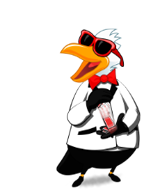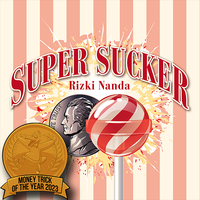
 Great Lecture
Report this review
Great Lecture
Report this review
Verified buyer
Pro Privacy ON
(login to see reviewer names)
on February 21st, 2016
Mark James is a very personable, funny, and entertaining performer who is technically excellent and
has perfect timing in both comedy and magic. His lecture was excellent and the material taught was
superb and there is something here for just about everyone. He is also a good teacher.
I’ve commented of some of the material taught, but not all. He went on for almost 4 and a half hours (between performance and interview) and covered a lot of stuff.
I do question some of the material he taught as it was not his and is currently being taught by others who created these routines, or routines identical to what he performed before he performed them. There were also issues on crediting.
Below are a few comments on standout pieces of the lecture, along with the description provided on the lecture advert.
Subliminal Numbers - An all but self working, easy to do number prediction with a killer ending for stage.
This is a fantastic routine. I really enjoyed it when Mark Paul performed and taught it in May during his lecture.
Mark James credits Mark Paul and says he say him perform it at a lecture. I’m not sure why Mr. James is teaching it as Mark Paul just taught it, and is teaching it during HIS lectures.
An accepted rationale for teaching a routine is if one has significantly changed the methodology or significantly changed the performance, neither of these were done by Mr. James, in my opinion. The structure of the routine is identical, as is the methodology. And the teaching of the routine was not as in depth as Mark Paul’s either. The only change(?) in the routine was in how he revealed the prediction, instead of the many methods Mark Paul used, he used a PEPSI logo.
Book Test - A multi phase, multi method book test with a double twist finish and some laughs along the way.
This was very entertaining. A fantastic routine and methods for adapting an off the shelf book for book tests.
The crediting was incomplete; the primary method taught and attributed to being based on Larry Becker and his Flash Back books is infact Dan Tong’s Peek-A-Book principle, exactly as Dan published it. Also, Larry Becker credits Dan Tong for the basis of the principle in his books.
Chop Cup - Mark’s take on the classic effect in magic. Mark breaks down his favorite parts of the routine along with the psychology and bits of business.
A straight to the point routine that was great. There was loads of helpful tips and bits of business explained, and Mark’s loads are completely invisible.
Envelopes - A funny bit of business that may just fool you. Envelopes is a quick bit of business that can go before almost any effect or routine on stage.
This was a nice routine, entertaining on its own, Mark uses this to allow for new routines to be added to the show without any worry about how well they will work or fit with the rest of the show. A really nice concept.
Sponge Balls - Some tips on the classic close up trick including a little add on that will not only fry your audience, but leaves you set up to end your routine.
Another very nice routine. What I liked the most out of this was a sponge ball vanish that can be done by those of us who have issues with their hands and movement of the fingers. It is essentially a moveless vanish.
Thought Of Card Under Cup - The think of a card plot has never been more surefire. Mark takes Joe Riding's plot, as taught to him by Mark Mason and gives you the confidence to go out and do it.
Mark’s work on this is fantastic. In addition to this and several other card routines, Mark teaches a wonderful top change, provides tips for top palming, give a course on the classic force, and teaches the miracle move and a strike double lift. It is a short master Class in card handling.
Almost Impromptu Pateo - A ‘pack small, play big’ effect that fits in your wallet and uses everything single person at the table.
The routine is an impromptu worker. I’ve been doing versions of this for years and it is always a strong piece. The table is filled with objects borrowed from the audience, they are eliminated one at a time, and the last remaining item marches a prediction that has been there since before the objects were borrowed.
Nothing new is added here again, though. The routine is almost identical to Richard Osterlind’s on his Penguin 13 Steps series and on his new Eerie DVD. The only addition was adding an envelope with the word “NO” printed on it for the prediction and some jokes before presenting the routine.
Force Deck - A quick impromptu force deck you can make at home, Mark used this to solve a small problem on a cruise ship.
OK, a force deck that can be made up very quickly if needed. My dislike is that it makes the helper an instant stooge. Mark explains the situation he was in, and how this came to be. It shows that he is creative and resourceful.
Salt Pour
Mark’s performance was upbeat and fun, but the routine was typical. His opening line was similar to Dave Williamson’s from his salt routine, but as Mark says, material on DVDs is free for anyone to use.
Mark says it is not performed much anymore, but it does seem to be taught a lot, and with Tony Clark just adding his routine for sale, it is selling quite a bit too. His explanation was good and covered all the points needed with references to a few of the resources (Kozak and Levent). Mark also mentioned the lid he used on his salt shaker, allowing for a pour without having to remove it. The rest of the explanation was standard and covered better by Scott Alexander is his free Penguin lecture a few months ago,
Toy Routine
Mark says this is not an Earth shattering effect, and it isn’t. He says he taught is to show correct methods (or something along those lines) of forcing. The routine is also excellent for personalizing a presentation. In his presentation, a toy and its color are randomly selected. This can actually be anything, perfect for products, special events…
Mark did ask about the color force, he was once told it belonged to a Patrick. During the lecture it was mentioned that the force was originated by Patrick Kuffs for his Tossed Out Cube, but was left at “his use was different.” True, he had cards covering every square on the cube, 54 card stickers.
BUT, the color force was previously used. In July 2007, Anabelle Taylor’s BENEATH THE MASK was published, her routine Red Hot Rubik’s Cube in this book uses the color force, and she credit’s Kuffs for the method. (Just to set the crediting of the Rubik’s Cube color force straight.)
This was an excellent lecture, the teach was good, the performance was excellent, and the material is great and covers closeup, parlor/stage, intimate, and mentalism. Everyone can get something from this lecture.
I’ve commented of some of the material taught, but not all. He went on for almost 4 and a half hours (between performance and interview) and covered a lot of stuff.
I do question some of the material he taught as it was not his and is currently being taught by others who created these routines, or routines identical to what he performed before he performed them. There were also issues on crediting.
Below are a few comments on standout pieces of the lecture, along with the description provided on the lecture advert.
Subliminal Numbers - An all but self working, easy to do number prediction with a killer ending for stage.
This is a fantastic routine. I really enjoyed it when Mark Paul performed and taught it in May during his lecture.
Mark James credits Mark Paul and says he say him perform it at a lecture. I’m not sure why Mr. James is teaching it as Mark Paul just taught it, and is teaching it during HIS lectures.
An accepted rationale for teaching a routine is if one has significantly changed the methodology or significantly changed the performance, neither of these were done by Mr. James, in my opinion. The structure of the routine is identical, as is the methodology. And the teaching of the routine was not as in depth as Mark Paul’s either. The only change(?) in the routine was in how he revealed the prediction, instead of the many methods Mark Paul used, he used a PEPSI logo.
Book Test - A multi phase, multi method book test with a double twist finish and some laughs along the way.
This was very entertaining. A fantastic routine and methods for adapting an off the shelf book for book tests.
The crediting was incomplete; the primary method taught and attributed to being based on Larry Becker and his Flash Back books is infact Dan Tong’s Peek-A-Book principle, exactly as Dan published it. Also, Larry Becker credits Dan Tong for the basis of the principle in his books.
Chop Cup - Mark’s take on the classic effect in magic. Mark breaks down his favorite parts of the routine along with the psychology and bits of business.
A straight to the point routine that was great. There was loads of helpful tips and bits of business explained, and Mark’s loads are completely invisible.
Envelopes - A funny bit of business that may just fool you. Envelopes is a quick bit of business that can go before almost any effect or routine on stage.
This was a nice routine, entertaining on its own, Mark uses this to allow for new routines to be added to the show without any worry about how well they will work or fit with the rest of the show. A really nice concept.
Sponge Balls - Some tips on the classic close up trick including a little add on that will not only fry your audience, but leaves you set up to end your routine.
Another very nice routine. What I liked the most out of this was a sponge ball vanish that can be done by those of us who have issues with their hands and movement of the fingers. It is essentially a moveless vanish.
Thought Of Card Under Cup - The think of a card plot has never been more surefire. Mark takes Joe Riding's plot, as taught to him by Mark Mason and gives you the confidence to go out and do it.
Mark’s work on this is fantastic. In addition to this and several other card routines, Mark teaches a wonderful top change, provides tips for top palming, give a course on the classic force, and teaches the miracle move and a strike double lift. It is a short master Class in card handling.
Almost Impromptu Pateo - A ‘pack small, play big’ effect that fits in your wallet and uses everything single person at the table.
The routine is an impromptu worker. I’ve been doing versions of this for years and it is always a strong piece. The table is filled with objects borrowed from the audience, they are eliminated one at a time, and the last remaining item marches a prediction that has been there since before the objects were borrowed.
Nothing new is added here again, though. The routine is almost identical to Richard Osterlind’s on his Penguin 13 Steps series and on his new Eerie DVD. The only addition was adding an envelope with the word “NO” printed on it for the prediction and some jokes before presenting the routine.
Force Deck - A quick impromptu force deck you can make at home, Mark used this to solve a small problem on a cruise ship.
OK, a force deck that can be made up very quickly if needed. My dislike is that it makes the helper an instant stooge. Mark explains the situation he was in, and how this came to be. It shows that he is creative and resourceful.
Salt Pour
Mark’s performance was upbeat and fun, but the routine was typical. His opening line was similar to Dave Williamson’s from his salt routine, but as Mark says, material on DVDs is free for anyone to use.
Mark says it is not performed much anymore, but it does seem to be taught a lot, and with Tony Clark just adding his routine for sale, it is selling quite a bit too. His explanation was good and covered all the points needed with references to a few of the resources (Kozak and Levent). Mark also mentioned the lid he used on his salt shaker, allowing for a pour without having to remove it. The rest of the explanation was standard and covered better by Scott Alexander is his free Penguin lecture a few months ago,
Toy Routine
Mark says this is not an Earth shattering effect, and it isn’t. He says he taught is to show correct methods (or something along those lines) of forcing. The routine is also excellent for personalizing a presentation. In his presentation, a toy and its color are randomly selected. This can actually be anything, perfect for products, special events…
Mark did ask about the color force, he was once told it belonged to a Patrick. During the lecture it was mentioned that the force was originated by Patrick Kuffs for his Tossed Out Cube, but was left at “his use was different.” True, he had cards covering every square on the cube, 54 card stickers.
BUT, the color force was previously used. In July 2007, Anabelle Taylor’s BENEATH THE MASK was published, her routine Red Hot Rubik’s Cube in this book uses the color force, and she credit’s Kuffs for the method. (Just to set the crediting of the Rubik’s Cube color force straight.)
This was an excellent lecture, the teach was good, the performance was excellent, and the material is great and covers closeup, parlor/stage, intimate, and mentalism. Everyone can get something from this lecture.
Add a comment
OPEN BOX
$36.98 (7% OFF)
59
Bestsellers
See all bestsellers
COOL BOX
4% now claimed
1
4
:
4
4
:
4
6
remaining

Act Builder beta




























